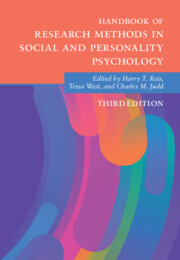Book contents
- Handbook of Research Methods in Social and Personality Psychology
- Cambridge Handbooks in Psychology
- Handbook of Research Methods in Social and Personality Psychology
- Copyright page
- Contents
- Figures
- Tables
- Contributors
- Introduction
- 1 The Romance of Research Methods
- Part I Before You Dive In
- Part II Basic Design Considerations to Know, No Matter What Your Research Is About
- Part III Deep Dives on Methods and Tools for Testing Your Question of Interest
- Part IV Understanding What Your Data Are Telling You About Psychological Processes
- 20 Measurement
- 21 Advanced Psychometrics
- 22 Dealing with Repeated Measures
- 23 The Design and Analysis of Data from Dyads and Groups
- 24 Random Factors and Research Generalization
- 25 Combining Statistical and Causal Mediation Analysis
- 26 Mathematical and Computational Models
- 27 Meta-analysis
- Index
- References
23 - The Design and Analysis of Data from Dyads and Groups
from Part IV - Understanding What Your Data Are Telling You About Psychological Processes
Published online by Cambridge University Press: 12 December 2024
- Handbook of Research Methods in Social and Personality Psychology
- Cambridge Handbooks in Psychology
- Handbook of Research Methods in Social and Personality Psychology
- Copyright page
- Contents
- Figures
- Tables
- Contributors
- Introduction
- 1 The Romance of Research Methods
- Part I Before You Dive In
- Part II Basic Design Considerations to Know, No Matter What Your Research Is About
- Part III Deep Dives on Methods and Tools for Testing Your Question of Interest
- Part IV Understanding What Your Data Are Telling You About Psychological Processes
- 20 Measurement
- 21 Advanced Psychometrics
- 22 Dealing with Repeated Measures
- 23 The Design and Analysis of Data from Dyads and Groups
- 24 Random Factors and Research Generalization
- 25 Combining Statistical and Causal Mediation Analysis
- 26 Mathematical and Computational Models
- 27 Meta-analysis
- Index
- References
Summary
The two statistical approaches commonly used in the analysis of dyadic and group data, multilevel modeling and structural equation modeling, are reviewed. Next considered are three different models for dyadic data, focusing mostly on the very popular actor–partner interdependence model (APIM). We further consider power analyses for the APIM as well as the partition of nonindependence. We then present an overview of the analysis of over-time dyadic data, considering growth-curve models, the stability-and-influence model, and the over-time APIM. After that, we turn to group data and focus on considerations of the analysis of group data using multilevel modeling, including a discussion of the social relations model, which is a model of dyadic data from groups of persons. The final topic concerns measurement equivalence of constructs across members of different types in dyadic and group studies.
Keywords
- Type
- Chapter
- Information
- Publisher: Cambridge University PressPrint publication year: 2024

